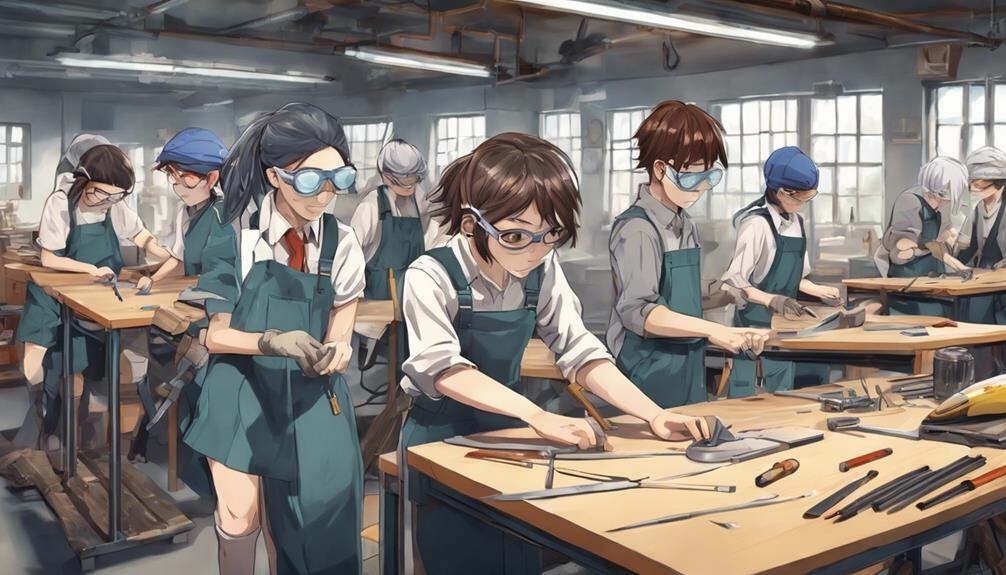Practical Training: Making Learning Hands-On
In the domain of education and professional development, the shift towards practical training methodologies has garnered significant attention. The integration of hands-on learning approaches has shown promise in transforming traditional educational practices. By emphasizing practical application over rote memorization, learners are better equipped to tackle real-world challenges.
This paradigm shift not only enhances skill acquisition but also bridges the gap between theoretical knowledge and practical implementation. The benefits of hands-on learning extend beyond the classroom, offering students unparalleled opportunities for growth and development.
The question remains: how can institutions effectively implement and optimize practical training to cultivate a new generation of proficient and adaptable learners?
Key Takeaways
- Hands-on learning enhances understanding and retention of complex concepts.
- Practical training cultivates critical thinking and problem-solving skills.
- Real-world scenarios bridge theory and practice effectively.
- Interactive workshops prepare students for academic and professional success.
Importance of Hands-On Learning
Hands-on learning is undeniably important for fostering a deeper understanding and retention of complex concepts. By actively engaging in practical activities, students develop essential skills that go beyond theoretical knowledge. This experiential learning approach allows individuals to apply theoretical concepts in real-world scenarios, enhancing their problem-solving abilities and critical thinking skills.
Skill development is a key aspect of hands-on learning. Through practical exercises, students have the opportunity to hone various skills such as teamwork, communication, and decision-making. These skills are essential for success in both academic and professional settings, making hands-on learning a valuable educational tool.
Moreover, hands-on learning promotes experiential learning, where individuals learn by doing. This active participation in the learning process not only solidifies theoretical concepts but also instills a sense of confidence and independence in students. By actively engaging with the material, learners can better internalize information and develop a deeper understanding of complex topics.
To summarize, hands-on learning is an invaluable approach that enhances skill development and promotes experiential learning.
Enhancing Skill Application
As we explore ways to enhance skill application in learning, we investigate various skill practice techniques and the integration of real-world scenarios.
By incorporating these elements, learners can actively engage with the material, applying their knowledge in practical situations to deepen their understanding.
This approach not only fosters hands-on experience but also cultivates critical thinking and problem-solving skills essential for success in various fields.
Skill Practice Techniques
To enhance skill application effectively, employing a variety of practice techniques is essential for developing proficiency in a particular skill.
Interactive simulations and experiential learning are two key methods that can greatly boost skill acquisition. Interactive simulations provide a hands-on, engaging way for learners to practice applying their skills in a controlled virtual environment. This technique allows for immediate feedback and adjustments, enhancing the learning experience.
On the other hand, experiential learning involves real-world application of skills in practical settings, enabling learners to gain firsthand experience and insights.
Real-world Scenarios
Employing real-world scenarios is a dynamic approach to further enhance skill application, allowing learners to immerse themselves in practical settings to refine their abilities and gain valuable insights.
Practical simulations and interactive workshops provide a hands-on approach that bridges the gap between theory and practice. Realistic scenarios challenge learners to think critically and apply their knowledge in authentic situations, fostering problem-solving skills.
Hands-on projects enable individuals to experience the complexities of real-world tasks, encouraging creativity and innovation. By engaging in these immersive learning experiences, participants develop a deeper understanding of concepts and enhance their practical abilities, preparing them for success in their respective fields.
Bridging Theory and Practice
Connecting academic concepts with real-world applications is essential in creating a meaningful learning experience. Practical applications and experiential learning play a vital role in bridging the gap between theory and practice. By engaging in hands-on workshops and interactive sessions, students can apply theoretical knowledge to real-world situations, enhancing their understanding and retention of the material.
Hands-on workshops provide an opportunity for students to put theory into practice, allowing them to see firsthand how concepts are applied in various industries. These interactive sessions not only reinforce theoretical knowledge but also help develop practical skills that are essential for success in the workforce. By actively participating in these activities, students gain valuable experience that can better prepare them for future challenges in their chosen field.
Real-World Problem Solving
Real-world problem-solving is at the core of effective hands-on learning. It involves applying theoretical knowledge to practical situations, fostering critical thinking and analytical skills.
Through hands-on experiences, students can develop a practical problem-solving approach that prepares them for real-world challenges.
Practical Problem-Solving Approach
Implementing a practical problem-solving approach in educational settings enhances students' ability to apply theoretical knowledge to real-world situations effectively. By adopting a hands-on approach, students can develop essential problem-solving strategies that are important for success in various fields.
Here are three benefits of incorporating a practical problem-solving approach:
- Critical Thinking Skills: Engaging in real-world problem-solving tasks promotes critical thinking skills, allowing students to analyze situations from different perspectives.
- Enhanced Creativity: Encouraging students to tackle practical problems fosters creativity and innovation, leading to unique solutions.
- Improved Decision-Making: Hands-on problem-solving activities help students practice making decisions based on available information, preparing them for decision-making in professional settings.
Application of Knowledge
By applying theoretical knowledge to real-world scenarios through hands-on problem-solving activities, students can develop practical skills that are transferable across various professional domains. Skill application is an important aspect of learning, as it allows students to bridge the gap between theory and practice.
Through hands-on techniques, learners can actively engage with the material, gaining a deeper understanding of how concepts work in real-life situations. This type of experiential learning enhances critical thinking, decision-making, and problem-solving abilities.
Hands-On Learning Experiences
Engaging in hands-on learning experiences allows students to actively apply theoretical knowledge to practical real-world problems, fostering a deeper understanding of concepts and enhancing critical thinking skills. Experiential learning through interactive workshops and simulation exercises provides students with a dynamic environment to test their knowledge and skills.
Hands-on projects enable learners to collaborate, experiment, and troubleshoot, preparing them for challenges they may face in their future careers. By engaging in these activities, students not only acquire theoretical knowledge but also gain practical experience, making the learning process more impactful and memorable.
Through hands-on learning experiences, students develop problem-solving skills and the ability to think creatively, attributes essential for success in today's competitive world.
Building Practical Expertise
Developing practical expertise is essential for mastering complex skills and excelling in real-world applications. Experiential learning plays a critical role in this process by providing hands-on opportunities for individuals to apply theoretical knowledge in practical settings. Through experiential learning, individuals actively engage in activities, experiments, and real-life simulations that enhance their understanding and proficiency in various fields. This approach not only fosters skill development but also encourages critical thinking, problem-solving, and decision-making abilities.
Practical expertise is built through repeated practice, feedback, and reflection on experiences. By immersing oneself in practical tasks, individuals can gain valuable insights, troubleshoot challenges, and refine their techniques over time. This iterative process allows learners to internalize concepts, develop muscle memory, and build confidence in their abilities. Moreover, experiential learning enables individuals to bridge the gap between theory and practice, preparing them for the complexities of the real world.
Immersive Learning Experiences
Immersive learning experiences provide a dynamic platform for individuals to actively participate in hands-on activities that deepen their understanding and skills in practical applications. These experiences go beyond traditional teaching methods, offering interactive simulations and experiential learning opportunities that engage learners in a more profound and memorable way.
- Virtual Reality (VR) Simulations: By immersing participants in simulated environments, VR technology allows them to interact with lifelike scenarios, enhancing their problem-solving skills and decision-making abilities.
- Augmented Reality (AR) Applications: AR overlays digital information onto the real world, enabling learners to manipulate virtual objects in a physical space, promoting a deeper understanding of complex concepts.
- Role-Playing Exercises: Through role-playing, individuals can step into different personas or scenarios, gaining firsthand experience and insights that enhance their empathy, communication skills, and ability to navigate diverse situations effectively.
These interactive and experiential methods not only make learning more engaging but also better prepare individuals for real-world challenges, ensuring practical knowledge and skills are effectively acquired and retained.
Industry-Relevant Training Methods
How can industry-relevant training methods align with the evolving needs of modern workplaces to foster practical skills and proficiency among learners?
Experiential learning and interactive workshops play an essential role in bridging the gap between theoretical knowledge and real-world application. By engaging learners in hands-on simulations and industry-relevant scenarios, training programs can better prepare individuals for the challenges they will face in their future careers.
Hands-on simulations offer a dynamic way for learners to apply their knowledge in a controlled environment, allowing them to make mistakes, learn from them, and improve without real-world consequences. These simulations can range from virtual reality experiences to physical tasks that mirror actual job responsibilities.
Industry simulations, on the other hand, replicate the specific conditions and demands of a particular sector, providing learners with insights into the intricacies of their chosen field.
Hands-On Benefits for Students
To truly harness the benefits of hands-on learning for students, it is imperative to understand how practical experiences directly enhance their academic and professional growth. Engaging activities and interactive workshops play a vital role in shaping the learning experience for students. Here are some key benefits of hands-on learning for students:
- Increased Retention: Engaging in hands-on activities allows students to apply theoretical knowledge in practical scenarios, leading to better retention of information.
- Enhanced Problem-Solving Skills: Interactive workshops challenge students to think critically, analyze situations, and come up with innovative solutions, thereby honing their problem-solving abilities.
- Real-World Application: Hands-on learning provides students with the opportunity to directly apply concepts learned in the classroom to real-world situations, bridging the gap between theory and practice.
Implementing Practical Training
Utilizing hands-on practical training methods in educational settings can greatly enhance students' acquisition of skills and knowledge. Implementing practical training involves designing interactive workshops and hands-on simulations that actively engage students in the learning process. These workshops provide a platform for students to apply theoretical knowledge in practical exercises, fostering experiential learning that solidifies their understanding.
One effective way of implementing practical training is through hands-on simulations that replicate real-world scenarios. These simulations challenge students to think critically, make decisions, and solve problems in a controlled environment. By participating in such activities, students gain valuable experience that prepares them for the complexities of their future careers.
Interactive workshops further complement practical exercises by encouraging collaboration, communication, and teamwork among students. These workshops not only enhance students' practical skills but also improve their interpersonal abilities, essential for success in any professional setting.
Conclusion
To summarize, practical training acts as the bridge that connects theoretical knowledge to real-world applications, creating a seamless path for students to enhance their skills and expertise.
It is like the hands-on compass that guides learners through immersive experiences, helping them navigate the complexities of their chosen field.
By providing industry-relevant training methods, practical training equips students with the tools they need to tackle real-world challenges with confidence and competence.







